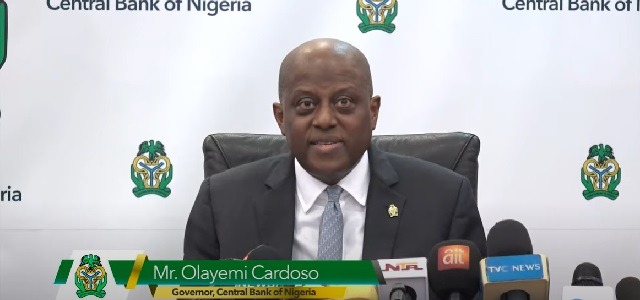Governor of the Central Bank of Nigeria (CBN), Olayemi Cardoso, has fingered inflation as one of the most significant threats to the economic welfare of Nigerians.
He disclosed this while speaking at the 2025 IMF and World Bank Spring Meetings in Washington, D.C.
Cardoso who pledged the CBN’s commitment to reducing inflation to single digits over the medium term, emphasised the urgency of tackling inflation to stabilise household incomes and improve the cost of living across the country.
He said: “Inflation remains the most disruptive force against the economic welfare of Nigerians. Our focus is to bring it down to single digits over the medium term.”
In March, Nigeria’s headline inflation rose to 24.23 per cent, up from 23.18 per cent in February, reflecting persistent pressures on food prices, essential goods, and the broader cost of living, exacerbating economic challenges for millions of Nigerians.
The inflationary trend has been attributed to rising prices of both food and non-food items, highlighting the need for sustainable monetary interventions.
The IMF in a recent projection, said Nigeria’s inflation rate will average 26.5 per cent in 2025, following the recent rebasing of the Consumer Price Index (CPI).
Although this marks a decline from 33.2 per cent in 2024, inflation is expected to spike again to 37.0 per cent by 2026, underlining the volatility of Nigeria’s economic landscape.
Cardoso said in spite the challenges, there was growing investor confidence in Nigeria’s reform agenda.
He cited the example of the country’s recent high-level investment forum at the Nasdaq Market Site in New York, an event that showcased Nigeria’s economic reforms and attracted interest from global investors and the diaspora, signalling optimism for the nation’s future economic trajectory.
Speaking in similar vein, Minister of Finance and Coordinating Minister of the Economy, Wale Edun, reiterated the government’s focus on economic growth and job creation.
Edun who also spoke at the IMF and World Bank meetings, said the country has a target of achieving 7 per cent economic growth, supported by investments in critical infrastructure such as digital connectivity, data access, and fibre optic networks.
The minister highlighted the government’s strategy to mobilise domestic revenue and crowd in private sector investments, creating an environment conducive to business growth.
“By stabilising the economy and driving private sector participation, we are creating sustainable jobs for young Nigerians and fostering inclusive growth,” Edun stated.
He also reaffirmed the government’s commitment to fiscal discipline, noting that Nigeria’s reform programme—spanning fiscal, monetary, and structural policies—has been recognised by international partners as being on the right track.
“Despite global uncertainty, Nigeria is poised for resilient, inclusive growth,” Edun added.
The minister emphasised the importance of flexible fiscal planning, stating, “A budget is a statement of intent; it must be continually recalibrated to reflect on-ground realities and available resources.”









